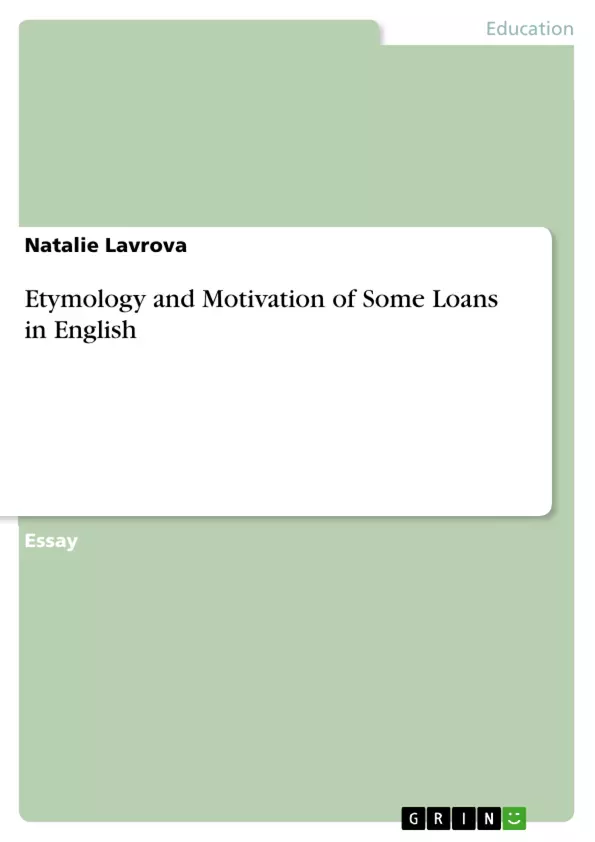Over the years English has been absorbing words from other languages at a pretty smart pace, sometimes giving something in return, sometimes capitalizing on the loan lexemes. As is known, the process of borrowing can be stimulated by various factors, both linguistic and extra-linguistic ones. In the present paper we shall predominantly focus on the latter type of reasons, when a word is borrowed either together with the object it denotes or because the recipient language lacks a lexeme that would render the phenomenon succinctly and accurately. The number of borrowed, that is, non-native words, in English has been estimated as veering between 60 and 80 %, the exact figure, however, is hard to arrive at, partly, because it is not settled when one should stop counting and what date (day) should be deemed as one which registers the quantity of foreign element precisely. Most of the borrowed words in the English word-stock are of Romance origin, which is explained by the historical contacts with Romans, the Norman French, as well as the sway of the Renaissance period in the European cultural tradition.
Over the years English has been absorbing words from other languages at a pretty smart pace, sometimes giving something in return, sometimes capitalizing on the loan lexemes. As is known, the process of borrowing can be stimulated by various factors, both linguistic and extra-linguistic ones. In the present paper we shall predominantly focus on the latter type of reasons, when a word is borrowed either together with the object it denotes or because the recipient language lacks a lexeme that would render the phenomenon succinctly and accurately. The number of borrowed, that is, non-native words, in English has been estimated as veering between 60 and 80 %, the exact figure, however, is hard to arrive at, partly, because it is not settled when one should stop counting and what date (day) should be deemed as one which registers the quantity of foreign element precisely. Most of the borrowed words in the English word-stock are of Romance origin, which is explained by the historical contacts with Romans, the Norman French, as well as the sway of the Renaissance period in the European cultural tradition. Due to the perceived higher level of development, the conquering nations did not encounter much resistance in terms of the acceptance and absorption of their words, partly because the words were not really imposed on the Britons: their assimilation was a natural and an inevitable consequence of either lacking designations for some phenomena or of the necessity to be understood by the nobility.
Most of the foreign words we discuss here have undergone the process of either partial or complete assimilation, and/or have been subject to the processes of demotivation and morphological simplification. The former term means that in the course of the development of the word and in the course of its semantic readjustment the recipient native speakers no longer associate the word with what it meant originally or with what it meant in the source language. The latter process, which is frequently combined with the former, presupposes that an originally compound word due to the phonetic development is no longer deemed as a compound, but as a “simple” one-stem word. The result is that many of the words that were borrowed into the English language may not be recognized as coming from a foreign source or as belonging to a particular language.
Frequently asked questions
What is the main topic of this text?
The text explores the borrowing of words in the English language, particularly focusing on the influence of other languages (especially Romance languages) and the reasons behind these linguistic adoptions.
What are the key reasons for borrowing words into English?
The text highlights two primary reasons: the introduction of new objects or concepts along with their names, and the lack of a suitable existing word in English to accurately and succinctly describe a phenomenon.
What percentage of English words are estimated to be borrowed?
The text mentions an estimate of between 60% and 80% of English words being of non-native origin.
Why are Romance languages so influential in English vocabulary?
The historical context, including contact with the Romans, Norman French influence, and the impact of the Renaissance, is cited as the reason for the significant contribution of Romance languages to the English lexicon.
What processes do borrowed words often undergo?
The text mentions assimilation (partial or complete), demotivation (loss of association with original meaning), and morphological simplification as common processes that foreign words undergo after being adopted into English.
What does "demotivation" mean in the context of borrowed words?
Demotivation refers to the phenomenon where native speakers no longer associate a borrowed word with its original meaning or its meaning in the source language.
What is the author's view on the importance of knowing word etymology?
While acknowledging the pragmatic view that knowing etymology isn't necessary for language competence, the author believes that investigating word origins can enrich the theory of nomination, provide insights into cognition, and facilitate understanding of people's mentality.
What does the text suggest about how words are chosen for particular referents?
The text proposes that the selection of a particular mode of nomination (i.e., choosing a specific word for a thing) is not entirely random. Often, words are based on metaphorical or metonymic transfer, leading to descriptive rather than purely terminological designations.
What reasons are given as to why a vaguely descriptive word may be chosen as the name of something instead of a more proper term?
The text suggests specifics of perception, lack of knowledge about the properties of the referent, or the striking, vivid image the referent forms in the mind of the speaker may be the reason.
- Citar trabajo
- Natalie Lavrova (Autor), 2010, Etymology and Motivation of Some Loans in English, Múnich, GRIN Verlag, https://www.grin.com/document/153123



